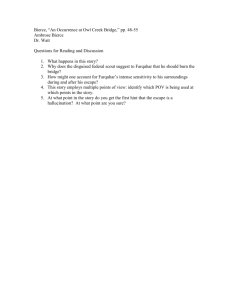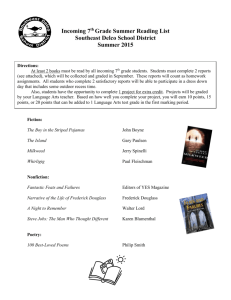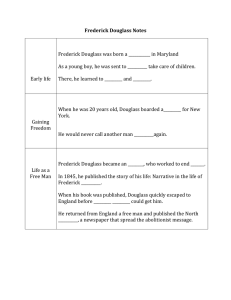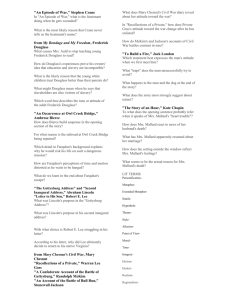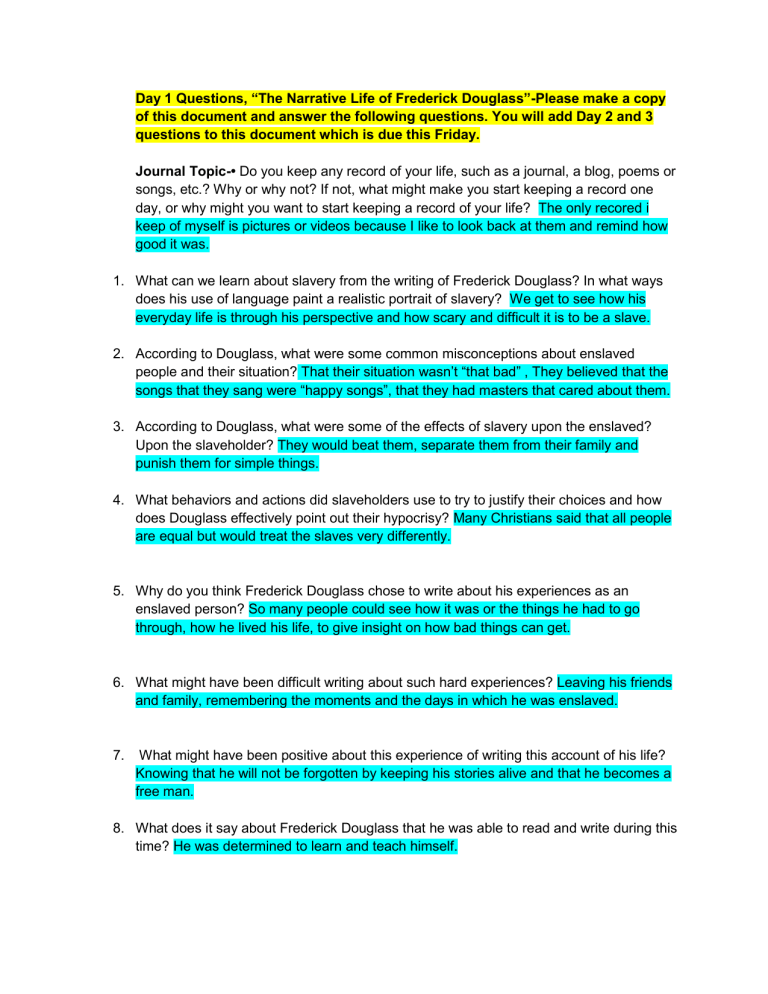
Day 1 Questions, “The Narrative Life of Frederick Douglass”-Please make a copy of this document and answer the following questions. You will add Day 2 and 3 questions to this document which is due this Friday. Journal Topic-• Do you keep any record of your life, such as a journal, a blog, poems or songs, etc.? Why or why not? If not, what might make you start keeping a record one day, or why might you want to start keeping a record of your life? The only recored i keep of myself is pictures or videos because I like to look back at them and remind how good it was. 1. What can we learn about slavery from the writing of Frederick Douglass? In what ways does his use of language paint a realistic portrait of slavery? We get to see how his everyday life is through his perspective and how scary and difficult it is to be a slave. 2. According to Douglass, what were some common misconceptions about enslaved people and their situation? That their situation wasn’t “that bad” , They believed that the songs that they sang were “happy songs”, that they had masters that cared about them. 3. According to Douglass, what were some of the effects of slavery upon the enslaved? Upon the slaveholder? They would beat them, separate them from their family and punish them for simple things. 4. What behaviors and actions did slaveholders use to try to justify their choices and how does Douglass effectively point out their hypocrisy? Many Christians said that all people are equal but would treat the slaves very differently. 5. Why do you think Frederick Douglass chose to write about his experiences as an enslaved person? So many people could see how it was or the things he had to go through, how he lived his life, to give insight on how bad things can get. 6. What might have been difficult writing about such hard experiences? Leaving his friends and family, remembering the moments and the days in which he was enslaved. 7. What might have been positive about this experience of writing this account of his life? Knowing that he will not be forgotten by keeping his stories alive and that he becomes a free man. 8. What does it say about Frederick Douglass that he was able to read and write during this time? He was determined to learn and teach himself. 9. Why do you think it was illegal to teach an enslaved person how to read or write or educate them in any way? In order to have complete control of someone you take away their rights and make them feel less, take away knowledge. 10. Why do you think some people, such as Frederick Douglass, risked their lives to learn to read and write? They understood that knowledge was power and if he was going to escape, they would think he was a free man. And they could read signs to know where the free states are located. 11. Why is it important to read such first-hand accounts of slavery, even though it was written over 160 years ago? Even if some of the content may be difficult, why do we need to face this history head-on? So things like this don't repeat themselves and we can learn from all our mistakes. Day 2- Please copy and paste these questions to this week’s literature document with the questions from “The Narrative of the Life of Frederick Douglass,” After you read, “An Occurrence at Owl Creek Bridge,” please respond to the following questions: 1.Please describe the situation Peyton Farquhar faces in Part I. He is about to be hung. 2. Part II of the story is a flashback. List its events in chronological order. Be sure to explain who visits Peyton Farquhar and what plan Farquhar conceives as a result of this visit. A soldier comes to Farquhar's house and tells him that Union soldiers have been working on the Owl Creek Bridge and will hang any civilian who interferes. At Farquhar's request, the soldier tells how one could burn the bridge. The soldier leaves but later return, headed north because he is a union spy. 3. Summarize in one sentence what Farquhar imagines in Part III. He imagines that the rope breaks, that he escapes, and that he makes it home. 4. What point of view does the writer use in Part III of the story which occurs within the few seconds before Farquhar dies? (first person, third person omniscient, third person limited), Why is this point of view particularly appropriate? Bierce uses a third-person limited perspective to reveal the desperate fight of Farquhar's imagination. This limited perspective allows Bierce's narrative to maintain a realist approach - even as Farquhar's mind flees the reality of his death. 5. Bierce’s style is to tell his story out of chronological order. How might the impact of the story be different if the events were revealed in order? If Bierce revealed the events of "An Occurrence at Owl Creek Bridge" in chronological order, the story would have lost much of its dramatic impact, tension, suspense, and surprise. 6. In this story the Civil War serves as a backdrop; Bierce’s main intent is to examine the psychology of someone in a life-or-death situation. What does this story imply about human psychology in the face of death?The mind essentially creates its own reality, especially in a moment of great stress. 7. Did you think the outcome of this story was credible and powerful, or did you think the surprise ending cheated the reader? Explain. I was shocked to find out that he had not escaped; since his escape seemed so incredible, his actual fate made sense. Day 3 Questions-Please copy and paste these questions to your document and answer them. All questions are due this Friday. QUESTIONS FOR DISCUSSION 1. Why does the speaker repeat, “War is kind”? Crane may be referring to the fact that war is kind because it allows those suffering from the battle of war to no longer suffer. 2. Why is this poem addressed to a maiden, a babe, and a mother? Why does the speaker tell them, “Do not weep”? The poem addresses the loved ones of the soldiers who died on the battlefield amid mayhem and chaos and he tells them to no weep because war is kind and he wants them to be rembered and they are at peace. 3. Why did the author set off two stanzas of the poem? Are the set-off stanzas of the poem addressed to the same people as the other stanzas? if not, who are they addressing? I think the author set off two stanzas in the poem because he is showing the two sides of war one is the poeple at home worrying and the other is the men on the battlefeild and there “thirst for war”. No the set-off stanzas are adressed to two diffrent people. As said in the begining he is addressing the mothers and wifes and other people at home and how they feel, as said in the first stanza “Do not weep, maiden, for war is kind”.. Then he goes on to address the men on the battlefield and how they feel, as said in the second stanza “These men were born to drill and die. “ 4. Why does the speaker repeat the words, “These men were born to drill and die”? The speaker at once draws attention to the soldiers’ and the futility of the purpose that has been given to them. 5. Does the speaker use the phrase “a field where a thousand corpses lie” with the same intention in both stanzas? The speaker draws attention to the soldiers’ (and by extension, all of humanity’s) lack of choice in life, and the futility of the purpose that has been given to them. 6. Does the speaker believe that “war is kind”? Does he want the reader to believe it? He does not really believe that war is kind but that it is a horrible and senseless thing.
